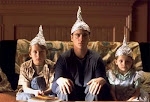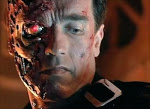 Starring Daniel Day-Lewis as Daniel Plainview and Paul Dano as Eli Sunday. Directed by Paul Thomas Anderson.
Starring Daniel Day-Lewis as Daniel Plainview and Paul Dano as Eli Sunday. Directed by Paul Thomas Anderson.
(Warning: Plot Spoilers)
Throughout There Will Be Blood, Eli Sunday and his Church of the Third Revelation exemplify the spiritual impotence of manmade religion. As an added feature to Eli's false religion, he also worships money, which is also spiritually impotent.
Soon after Daniel sets up to drill for the first time Eli requests an audience before the townspeople at the oil well's grand-opening, but Daniel very appropriately denies Eli's request. Eli says that he wants to "bless the drilling," but, in reality, he only wants to boost his congregation's PR by piggy-backing on Daniel's ingenuity and hard work.
Daniel continues to outmaneuver Eli for the rest of the movie, which is appropriate from the point of view of God's kingdom. Eli is a worldly man posing as a man of the church while Daniel is a worldly man who acts like what he is: a worldly man. Therefore, it is appropriate that Daniel should beat Eli at a game he only plays in secret.
Eli claims to worship God while, with his actions, he worships money. Daniel, to his credit, worships money with both his heart and actions.
Christ teaches his followers to conduct themselves with business savvy and yet avoid excessive preoccupation with the world: "No one can serve two masters, for either he will hate the one and love the other, or he will be devoted to the one and despise the other. You cannot serve God and money." (Matthew 6:24) and "seek first the kingdom of God and his righteousness, and all these things will be added to you." (Matthew 6:33)
Eli is entirely too distracted with the false power of money... but his religion never taught him any better. Not even the ostentatious cross he dangles from his neck can save him from having to beg Daniel for money.
Eli is an energetic man caught up in a lot of false spirituality. He is so distracted by tradition and religious showboating that he draws in a congregation of similarly distracted individuals. He even uses his position in the church as an excuse to take out his frustration on his father, Abel Sunday, whom he attacks both verbally and physically. It is ironic that Eli says, "God doesn't save stupid people" because, if this is true, then Eli is doomed in more ways than one.
 Eli feels a great deal of self-importance, which is natural for any young person who takes on a position of authority prematurely. Religion makes it possible for young people to go through the motions that make them look experienced. A young person need only learn how to say the right things at the right time to be accepted as expert amongst his religious colleagues. In this way it is also appropriate that Daniel outmaneuvers Eli: Daniel is more experienced than Eli. Daniel has been through more hardship and life-experience and is therefore better equipped endure life's difficulties.
Eli feels a great deal of self-importance, which is natural for any young person who takes on a position of authority prematurely. Religion makes it possible for young people to go through the motions that make them look experienced. A young person need only learn how to say the right things at the right time to be accepted as expert amongst his religious colleagues. In this way it is also appropriate that Daniel outmaneuvers Eli: Daniel is more experienced than Eli. Daniel has been through more hardship and life-experience and is therefore better equipped endure life's difficulties.
The final scene of the movie opens with Daniel passed out on his face in the middle of his private bowling alley. At this point we are led to believe that he has become a combination of psycho, burn-out and fall-down drunk. Then Eli strolls in, clean cut, talking about his successful "mission." Before the scene is over, however, Daniel tricks Eli into proclaiming that he is "a false prophet and God is a superstition." Within a few minutes Daniel casts doubt on everything Eli believes. Then Daniel kills Eli. It turns out that Eli was coming to Daniel to ask for (can you guess?) ... money.
Money is the ultimate power in There Will Be Blood. Everyone bows down to its authority, even the religiously outspoken Mr. Sunday. But money never has and never will do anything substantial for anyone. Ultimately it didn't even help Daniel even though he accumulated more than everyone around him. He still lost everything truly valuable in his life, from family and friends to any personal joy or contentment.
There Will Be Blood
Subscribe to:
Post Comments (Atom)

























10 comments:
I liked the movie very much. Its a shame about fake spirtuality being driven by money but thats the case :(
Great analysis. LOTS of stuff going on in this movie thematically, and I think I'll have to watch it again to gain a better understanding. I thought the performances were great.
What did you make of the whole Eli & his twin thing? I was confused...I thought this was kind of one thread that the director forgot to tie up, because it was left so vague. Also, there seemed to be quite a fast forward at the end, so we never really found out what became of that town and the three drills that Plainview started.
i highly doubt that not explaining the twin-twist was an oversight on the part of the director...
i suspect this was supposed to illustrate the consistency of Eli's connivery; he lied to Daniel about being a twin to make a quick buck for his church... this is consistent with Eli's character after all: he's always trying to make a buck for his church. Notice how, later on, when the family is sitting around the table, no "twin" ever shows up...
that's my theory, correct me if i missed something (such as the father saying "Eli, where's your twin brother, Paul?")
Wow, this looks amazing. I like the religious references too. It is almost like Cain and Abel, and Eli's father is named Abel.
I had wondered whether this was worth seeing, since I thought Daniel Day-Lewis's character might be similar to his character in "Gangs of New York", which I didn't really care for. But this movie does sound good. Thanks.
yeah. thats about right.
but the thing about the twin... when the original brother went to daniel, he said he was basically running away and selling the family out. so daniel never expected to see the 'twin' by the time eli was introduced. he suspected eli had played a con on him, but by the time he came to that conclusion it really didn't matter because he had already owned the town by that point.
good review. I took the twin thing to be a sort of Cane and Abel twist too. This was one of the movie's themes, since there was that other imposter that pretended to be Plainview's brother, and Plainview and Eli could be seen as two sides of ambition.
great movie. Daniel Day-Lewis has a great performance! But not quite good as Gangs Of NY, in my opinion.
When Eli was yelling at his father didn't he say something along the lines of "Stupid brother told him we had oil because he knew my stupid father would give it to him"
And at the end of the movie Daniel tells Eli that he wasn't special his brother was because his brother came to him.
Re. the twin-twist being faked, my recollection of the movie is that Eli specifically referenced Paul during the argument with his father... but I'd have see it again to be sure.
Good perspective on the film. As I noted in my review, it's strange that so many critics accused Plainview of being a liar when in fact he was probably the most truthful character in the whole movie. Eli, in contrast, was an inveterate liar and manipulator.
I'm a firm believer of the school of thought that, as far as understanding a film is concerned, we shouldn't assume upon which nothing has been hinted. As far as Eli and the twin are concerned, it was a casting problem. I think it adds a coating more than anything else. But then, I might be wrong.
I would beg to disagree with your inference, this statement - "He still lost everything truly valuable in his life, from family and friends to any personal joy or contentment."
From Daniel's POV, all this never mattered in the first place. Family for him was a prop to rest his tired day on. I think he respects and loves nobody and that includes God. From the way I look at it, I do not think that the last image is of a broken man, it is of a man who has finally vanquished all opposition there is, and is catching some breath.
By the way, great review.
Post a Comment